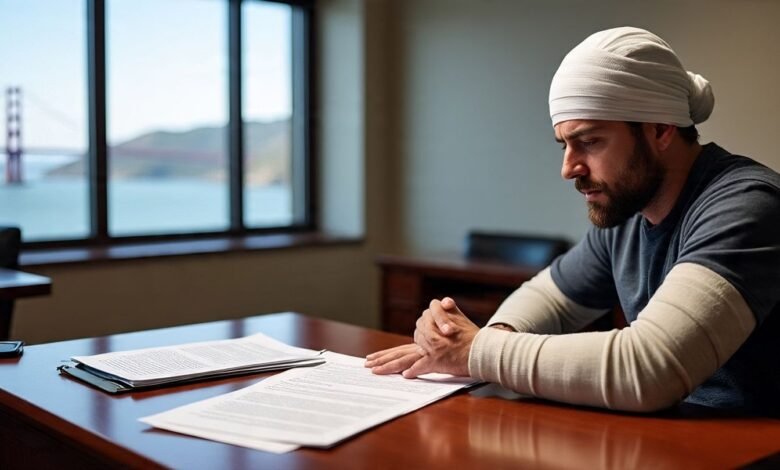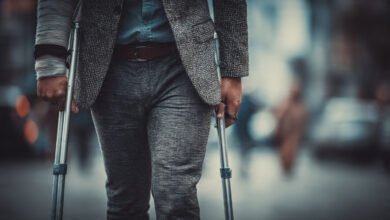
Your Guide to Choosing the Best Personal Injury Lawyer in California
Find the best personal injury lawyer in California. Expert guide to choosing top attorneys, evaluating experience, fees & getting maximum compensation.
When accidents happen and injuries occur due to someone else’s negligence, finding the best personal injury lawyer in California becomes a critical decision that can dramatically impact your financial recovery and future well-being. California’s legal landscape is complex, with over 170,000 attorneys practicing in the state, making it the second-largest legal market in the nation. With such an overwhelming number of choices, selecting the right California personal injury attorney requires careful consideration and strategic evaluation.
The stakes couldn’t be higher when dealing with personal injury cases in California. Personal injury law covers a broad spectrum of incidents including car accidents, medical malpractice, slip and fall accidents, defective product injuries, and wrongful death cases. Each type of case requires specialized knowledge of California state laws, local court procedures, and the unique challenges that arise in the Golden State’s diverse legal jurisdictions.
The right personal injury lawyer can mean the difference between receiving fair compensation for your injuries and walking away with inadequate settlement amounts that fail to cover your medical expenses, lost wages, and long-term care needs. In California’s competitive legal environment, insurance companies employ sophisticated tactics to minimize payouts, making experienced legal representation not just beneficial but essential for protecting your rights.
This comprehensive guide will walk you through the essential factors to consider when selecting a personal injury lawyer near me in California. From understanding different types of personal injury cases to evaluating attorney credentials, fee structures, and local expertise, you’ll gain the knowledge needed to make an informed decision. Whether you’re dealing with a car accident in Los Angeles, a slip and fall in San Francisco, or medical malpractice in San Diego, the principles outlined in this guide will help you identify the top personal injury attorneys who can effectively advocate for your interests and secure the compensation you deserve.
Time is often of the essence in personal injury cases due to California’s statute of limitations, so understanding how to quickly identify and retain qualified legal representation can be the difference between a successful claim and a missed opportunity for justice.
Understanding Personal Injury Law in California
California’s Legal Framework for Personal Injury Cases
California operates under a fault-based system for personal injury cases, meaning the responsible party pays for damages caused by their negligent or intentional actions. Personal injury law in California encompasses various types of incidents where one party’s actions result in physical, emotional, or psychological harm to another person.
California follows a “comparative fault” principle, which means both parties involved in an accident can share responsibility for damages while still presenting a claim. If a victim is found partially responsible, their compensation may be reduced proportionally. This unique aspect of California law makes it crucial to have an experienced California personal injury lawyer who understands how to navigate these complex liability determinations.
Types of Personal Injury Cases in California
Personal injury attorneys in California handle a wide range of case types, each requiring specific expertise:
- Car accident cases: Including multi-vehicle collisions, hit-and-run accidents, and drunk driving incidents
- Medical malpractice: Hospital negligence, surgical errors, and misdiagnosis cases
- Slip and fall accidents: Premises liability cases in retail stores, restaurants, and public properties
- Product liability: Defective products causing harm to consumers
- Workplace injuries: Beyond workers’ compensation claims, pursuing third-party liability
- Wrongful death cases: When negligence results in fatalities
Statute of Limitations and Filing Requirements
In California, personal injury victims generally have two years from the date of injury to file a lawsuit. However, there are exceptions and shorter time limits when suing government entities. The statute of limitations is a legal deadline that, if missed, can permanently bar your right to seek compensation.
This strict timeline emphasizes the importance of consulting with a personal injury attorney California as soon as possible after an accident. Early legal intervention allows attorneys to preserve evidence, interview witnesses while memories are fresh, and ensure all procedural requirements are met.
Key Factors to Consider When Choosing a Personal Injury Lawyer
Experience and Specialization
When seeking the best personal injury lawyer, experience in handling cases similar to yours is paramount. Personal injury law firms California often specialize in specific types of cases. For example, if your case involves medical malpractice, you should seek an attorney with extensive experience in medical negligence cases rather than a general personal injury practitioner.
Key experience factors to evaluate:
- Years of practice in personal injury law
- Number of cases handled similar to yours
- Trial experience versus settlement-only practice
- Knowledge of California-specific laws and regulations
Track Record and Success Rate
A lawyer’s success rate and track record provide valuable insights into their competence and ability to secure favorable outcomes. Top personal injury lawyers California typically maintain detailed records of their settlements and verdicts.
Important metrics to review:
- Settlement amounts achieved for similar cases
- Percentage of cases won versus lost
- Average time to resolution
- Client satisfaction ratings and testimonials
Resources and Firm Size
Personal injury cases often require substantial resources, including medical experts, investigators, accident reconstruction specialists, and other professional witnesses. The firm you choose should have the financial capacity and professional network to thoroughly investigate and present your case.
Resource considerations:
- Access to medical experts and specialists
- Investigative capabilities
- Technology and case management systems
- Support staff availability
Communication and Compatibility
Effective communication is crucial during what can be a lengthy and stressful legal process. Your California injury lawyer should be responsive, patient, and capable of explaining complex legal concepts in understandable terms.
Communication factors:
- Responsiveness to calls and emails
- Regular case updates and progress reports
- Availability for questions and concerns
- Language capabilities if needed
Evaluating Attorney Credentials and Licensing
California State Bar Verification
Before hiring any attorney, verify their license with the California State Bar and ensure they’re in good standing. The State Bar’s website allows you to search for attorneys and check for any disciplinary actions or complaints filed against them.
Verification checklist:
- Active California bar license
- No history of disciplinary actions
- Malpractice insurance coverage
- Professional memberships and certifications
Educational Background and Training
Look for attorneys with strong educational backgrounds and ongoing legal education in personal injury law. Many top personal injury attorneys California have specialized training in trial advocacy, negotiation, and medical-legal issues.
Professional Recognition and Awards
Recognition from legal organizations and peer review ratings can indicate attorney competence and reputation within the legal community. Peer review websites like Martindale-Hubbell allow lawyers to rate their colleagues based on legal competency and ethical standards.
Understanding Fee Structures and Costs
Contingency Fee Arrangements
Most personal injury lawyers work on a contingency fee basis, meaning they only receive payment if they win your case. Personal injury attorney fees California typically range from 33% to 40% of the settlement or verdict amount.
Contingency fee advantages:
- No upfront legal costs
- Attorney incentive to maximize recovery
- Access to legal representation regardless of financial situation
- No payment if case is unsuccessful
Additional Costs and Expenses
While attorney fees may be contingent, there are often additional costs associated with personal injury cases. These can include court filing fees, expert witness fees, medical record retrieval costs, and investigation expenses.
Cost considerations:
- Who pays for case expenses during litigation
- How costs are handled if the case is unsuccessful
- Detailed breakdown of potential expenses
- Clear explanation of fee structure in writing
Fee Agreement Transparency
The fee arrangement should be clearly stated in the representation agreement you sign when becoming a client. Never hesitate to ask questions about anything you don’t understand in the fee agreement.
The Importance of Local Expertise in California
Jurisdiction-Specific Knowledge
Personal injury cases must generally be filed where the injury occurred or where the defendant lives or does business. Personal injury lawyers California with local expertise understand the nuances of different county courts, local judges’ preferences, and regional jury tendencies.
Local expertise benefits:
- Knowledge of local court procedures
- Relationships with local medical experts
- Understanding of regional settlement trends
- Familiarity with local insurance adjusters
California-Specific Legal Requirements
California has unique laws and regulations that can significantly impact personal injury cases. California personal injury attorneys must understand state-specific requirements such as:
- Comparative negligence rules
- No-fault insurance limitations
- Specific statute of limitations variations
- California Evidence Code requirements
Geographic Accessibility
Choosing a personal injury lawyer near me offers practical advantages including easier in-person meetings, local court appearances, and immediate access to the accident scene for investigation purposes.
Questions to Ask During Initial Consultations
Case-Specific Inquiries
Most personal injury attorneys offer free initial consultations, providing an opportunity to evaluate their suitability for your case. Come prepared with specific questions about your situation.
Essential questions to ask:
- How many cases like mine have you handled?
- What is your success rate for similar cases?
- What is your assessment of my case’s value?
- How long do you expect my case to take?
- What is your fee structure and payment arrangement?
Attorney Availability and Case Management
Ask about the lawyer’s current caseload to ensure they can give your case the attention it deserves. An overloaded attorney may not be able to provide the personalized attention your case requires.
Caseload considerations:
- Current number of active cases
- Who will handle day-to-day case management
- Availability for client communications
- Trial schedule and availability
Strategy and Approach
Understanding how the attorney plans to approach your case can give you confidence in their competence and compatibility with your goals.
Strategic questions:
- What is your strategy for my case?
- How do you typically handle negotiations with insurance companies?
- Are you prepared to take my case to trial if necessary?
- What evidence will be crucial for my case?
Red Flags to Avoid When Selecting an Attorney
Warning Signs of Unqualified Representation
Several red flags should alert you to potentially problematic attorneys. Being aware of these warning signs can help you avoid costly mistakes in attorney selection.
Red flags include:
- Refusing to provide information about past case results
- Making unrealistic promises about settlement amounts
- Pressuring you to accept early settlement offers
- Lacking malpractice insurance coverage
- Requesting upfront fees for contingency cases
Unethical Solicitation Practices
Legal ethics regulations prohibit attorneys from soliciting business by contacting accident victims directly. If a lawyer contacts you uninvited after learning about your accident, this is a significant red flag.
Poor Communication Practices
Attorneys who are difficult to reach, fail to return calls promptly, or seem disinterested during consultations may not provide the level of service you need during your case.
Preparing for Your First Attorney Meeting
Gathering Essential Documentation
Come prepared with a clear, detailed narrative of what happened, including the sequence of events before and after the accident. Having organized documentation will help the attorney better understand your case.
Important documents to bring:
- Police reports and accident documentation
- Medical records and bills
- Insurance correspondence
- Witness contact information
- Photographs of the accident scene and injuries
- Employment records showing lost wages
Questions About Your Situation
Be prepared to explain everything that happened as clearly and concisely as possible. Write down your recollection of events, including details about the accident, injuries sustained, and impact on your daily life.
Realistic Expectations
Understand that initial consultations are evaluation sessions where both you and the attorney determine if there’s a good fit. Don’t feel pressured to hire an attorney immediately during the first meeting.
Maximizing Your Personal Injury Claim
The Role of Medical Documentation
Comprehensive medical documentation is crucial for establishing the extent of your injuries and their impact on your life. California injury attorneys rely heavily on medical evidence to support damage claims.
Medical documentation needs:
- Complete medical records from all treating physicians
- Diagnostic test results and imaging studies
- Treatment plans and prognosis reports
- Medical expert opinions when necessary
Evidence Preservation
Collecting and preserving evidence is crucial for proving your position in a personal injury case. This includes photographs of the accident scene, vehicle damage, physical injuries, medical bills, doctor’s reports, witness statements, and police reports.
Working Effectively with Your Attorney
Once you’ve selected your personal injury lawyer California, maintaining open communication and following their guidance will help maximize your case’s potential. Provide all requested information promptly and keep your attorney informed of any developments in your medical treatment or circumstances.
Conclusion
Choosing the best personal injury lawyer in California requires careful evaluation of experience, credentials, resources, and compatibility with your specific needs. The decision you make can significantly impact not only the financial outcome of your case but also your overall experience during what is often a challenging and stressful time. By focusing on attorneys with proven track records in cases similar to yours, verified credentials through the California State Bar, transparent fee structures, and strong communication skills, you position yourself for the best possible outcome. Remember that California personal injury attorneys working on contingency fee arrangements are motivated to achieve maximum compensation since their fees depend on your success. Take advantage of free consultations to evaluate multiple attorneys, ask detailed questions about their experience and approach, and trust your instincts about who will best advocate for your interests. With California’s two-year statute of limitations for most personal injury cases, prompt action in selecting qualified legal representation is essential for protecting your rights and securing the compensation you deserve for your injuries, medical expenses, lost wages, and pain and suffering.







